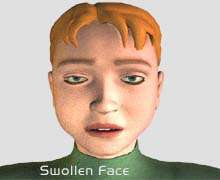Nephrotic Syndrome Symptoms
Irrespective of what causes Nephrotic Syndrome, the following are the most common signs and symptoms of the condition. However, it should be noted that each individual might experience symptoms differently.
Symptoms of Nephrotic Syndrome may include edema (swelling of face, abdomen and body), proteinuria (passing of protein in urine), hypoalbuminemia (low level of proteins in blood), and hyperlipidemia (high amount of lipids in blood).
01 Edema: Nephrotic Syndrome is characterized by proteinuria, hypoalbuminemia, and hyperlipidemia. The first noticeable outcome of all these metabolic deviations is edema or bloating of the body. It is the major clinical manifestation and presenting symptom in approximately 95-99% of cases with Nephrotic Syndrome. Edema often is so subtle in onset that the family may believe that the individual merely is gaining weight rapidly. Edema in the early phase appears in areas around the eyes, feet and hands, face.
In later stages, swelling may occur in the abdomen (ascites).

Ultimately, the edema may become generalized and can be massive (anasarca). Typically, edema often is worse on the face in the morning (upon arising) and is found predominantly in the lower extremities later in the day. It can cause feelings of tightness in the extremities, having an impact on one’s mobility.
02 Oliguria: Oliguria means reduction in the quantity of normal urine. The individual with Nephrotic Syndrome visits lavatory less often than before.
03 Hematuria: Hematuria means passage of blood in the urine. An occasional patient of Nephrotic Syndrome presents with gross hematuria.
04 General symptoms: Regardless of the type of Nephrotic Syndrome, patients commonly have loss of appetite (anorexia), become irritable, feel fatigued, and appear pale.
05 Diarrhea: Patients commonly complain of diarrhea, which is secondary to edema of the bowel wall.
06 Respiratory distress: If ascites is marked, patients commonly complain of respiratory distress, with difficulty in breathing or shallow, rapid breathing.
07 High blood pressure: Patients of Nephrotic Syndrome, whether young or old, have raised blood pressure.
08 Susceptibility to infections: Children with Nephrotic Syndrome occasionally present with fever and a septic picture. In a large fraction of these patients, the peritoneal cavity is the site of the infection.
09 Thromboembolism : Sometimes, patient with Nephrotic Syndrome get blood clots in the blood vessels of their legs or hands.
Video on Symptoms
If this happens, patient will complain of:
- severe pain and swelling in arm or leg
- changes in color or temperature of arm or leg
Written & Approved by-
Dr. Rajesh Shah
M.D. (Hom.)